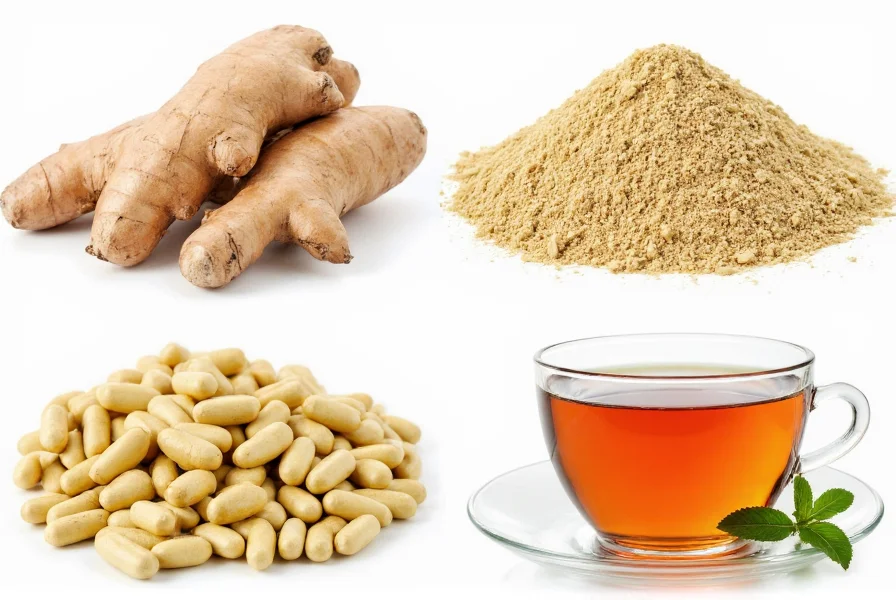Ginger (Zingiber officinale) has been used for centuries in traditional medicine systems across Asia and the Middle East. Modern scientific research now validates many of these traditional uses, revealing the powerful bioactive compounds within this knotted rhizome. The distinctive pungent flavor comes primarily from gingerols, which transform into shogaols when dried or heated, both demonstrating significant therapeutic properties.
The Science Behind Ginger's Health Properties
Over 100 bioactive compounds have been identified in ginger, with gingerols representing the most extensively studied. These compounds interact with multiple physiological pathways in the human body. A comprehensive review published in the International Journal of Preventive Medicine analyzed 60 studies on ginger's therapeutic effects, confirming its efficacy for several health conditions when used appropriately.

Proven Health Benefits of Ginger
Nausea and Digestive Relief
Ginger stands as one of the most effective natural remedies for nausea. Clinical trials demonstrate its effectiveness for:
- Morning sickness during pregnancy (studies show 1g daily reduces symptoms)
- Post-operative nausea
- Chemotherapy-induced nausea
- Motion sickness
The mechanism involves ginger's ability to accelerate gastric emptying and modulate serotonin receptors in the digestive tract. For digestive health support, consuming 1-1.5g of ginger daily shows significant benefits according to research in Nutrition Journal.
Anti-Inflammatory Effects
Ginger's potent anti-inflammatory properties make it valuable for managing chronic inflammatory conditions. Studies show ginger extract inhibits multiple inflammation pathways, including COX-2 and 5-LOX enzymes. Research published in Arthritis found that 500-1000mg of ginger extract daily reduced osteoarthritis pain by 30% compared to placebo.
| Condition | Effective Dosage | Study Duration | Reported Improvement |
|---|---|---|---|
| Osteoarthritis | 500mg-1g daily | 3-12 weeks | 25-35% pain reduction |
| Muscle Pain | 2g raw ginger daily | 6 days | 25% reduction in soreness |
| Nausea Relief | 1-1.5g ginger | As needed | 40-50% symptom reduction |
Pain Management
Regular ginger consumption shows promise for managing various types of pain. A study in The Journal of Pain found that daily ginger supplementation reduced muscle pain from exercise by 25%. The anti-inflammatory compounds in ginger appear to work similarly to NSAIDs but without the gastrointestinal side effects commonly associated with long-term NSAID use.
Cardiovascular Support
Emerging research suggests ginger may support heart health through multiple mechanisms. Studies indicate ginger can help lower LDL cholesterol and triglycerides while improving blood circulation. Research in Journal of Cardiovascular Pharmacology demonstrated that 3g of ginger powder daily for 45 days significantly reduced markers of oxidative stress in patients with type 2 diabetes.
Blood Sugar Regulation
For individuals managing blood sugar levels, ginger shows potential benefits. A clinical trial published in Complementary Therapies in Medicine found that 2g of ginger daily for 12 weeks reduced fasting blood sugar by 12% and improved insulin sensitivity in diabetic patients.

How to Incorporate Ginger Into Your Routine
Maximizing ginger's benefits requires understanding the different forms and their appropriate uses:
- Fresh ginger root: Contains highest levels of gingerols. Grate 1-2 teaspoons into smoothies, stir-fries, or tea.
- Dried ginger powder: More concentrated shogaols. Use 1/4-1/2 teaspoon in baking or cooking.
- Ginger tea: Steep 1-2 tablespoons fresh ginger in hot water for 10 minutes for digestive support.
- Supplements: Standardized extracts provide consistent dosing (typically 250-500mg).
Safety Considerations and Potential Side Effects
Ginger is generally safe for most people when consumed in food amounts or up to 4g daily as a supplement. However, certain individuals should exercise caution:
- Those taking blood thinners should consult a physician due to ginger's mild anticoagulant properties
- People with gallstones should use ginger cautiously as it may increase bile production
- Excessive consumption (more than 4g daily) may cause heartburn or mouth irritation
- Pregnant women should limit to 1g daily for nausea relief
Unlike many pharmaceutical options for inflammation and nausea, ginger typically produces minimal side effects when used appropriately. However, it's always wise to discuss new supplements with your healthcare provider, especially if managing chronic conditions or taking medications.
Maximizing Ginger's Benefits Through Proper Preparation
The way you prepare ginger affects its bioactive compounds. Crushing or grating fresh ginger releases more gingerols than slicing. Cooking transforms some gingerols into shogaols, which are more potent but less abundant. For maximum benefit, try combining raw and cooked preparations throughout the day.
Conclusion
Ginger's impressive range of scientifically-supported health benefits makes it a valuable addition to a health-conscious lifestyle. From its proven effectiveness against nausea to its anti-inflammatory properties that rival some medications, this ancient remedy continues to demonstrate relevance in modern health practices. By understanding the appropriate forms, dosages, and applications, you can harness ginger's therapeutic potential while minimizing any potential side effects. As with any natural remedy, consistency and proper usage determine effectiveness—incorporating ginger regularly into your diet provides the most significant long-term benefits.











 浙公网安备
33010002000092号
浙公网安备
33010002000092号 浙B2-20120091-4
浙B2-20120091-4